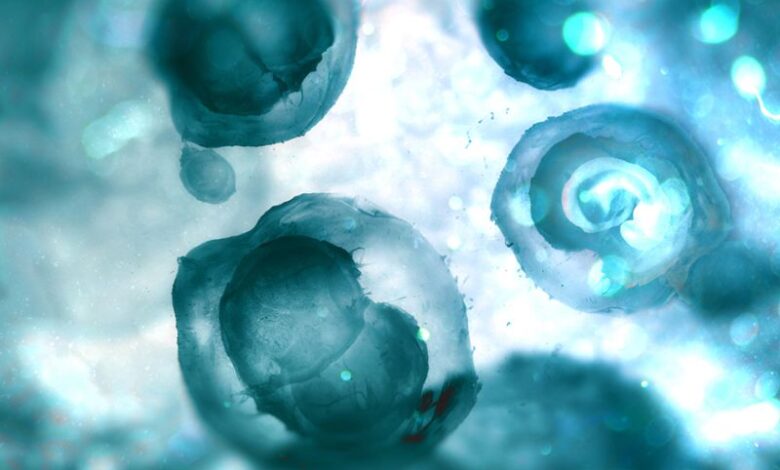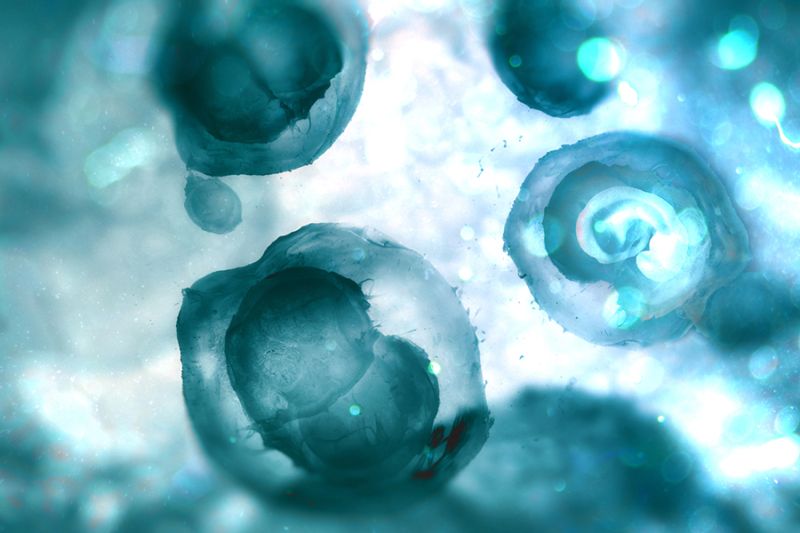First reported synthetic human embryo sparks ethical concerns, creates questions

 Human embryos. / Andrii Vodolazhskyi/Shutterstock
Human embryos. / Andrii Vodolazhskyi/Shutterstock Washington, D.C. Newsroom, Jun 19, 2023 / 16:00 pm (CNA).
Cambridge University researchers developed the world’s first synthetic human embryo models using stem cells but without using an egg or sperm, which has sparked ethical concerns and questions about whether scientists are on the verge of creating human life without fertilization.
This creation, first reported by The Guardian, uses a single embryonic stem cell and develops it into an embryo-like structure that resembles an embryo in the gastrulation stage, which occurs at about 14 days after fertilization in an embryo. The models, however, do not contain every component of an embryo, which would likely be necessary for it to become a fully developed human being.
The full research is yet to be published and has not undergone peer review.
Melissa Moschella, a philosophy professor at The Catholic University of America in Washington, D.C., whose expertise includes bioethics, told CNA that it does not appear that the model is intended or expected to develop to have the full organizational or development structure of an embryo based on what has been released to the public so far.
“It seems like what they have created is a model of certain parts of an embryo … [but it] does not seem to have the fully whole organizational potential of a real human embryo, which is why they call it a model,” Moschella said.
Based on the information available, Moschella said the model appears to be more analogous to other models created to study types of human tissues, such as models of kidneys or models of brains, which “is not a whole human being.”
Still, Moschella warned that the creation of a model synthetic embryo that closely resembles a natural embryo is “worrisome.” She cautioned that “there are some real uncertainties about where the line is” between an embryo model and a real human embryo, and it’s possible that researchers “may cross that line from something that is merely a model and something that actually is a human being” without even knowing they did so.
“We are playing with fire here [by] experimenting with the origins of human life when it’s not quite clear how we would know when what we’ve created is actually a human being,” Moschella added.
Moschella said that embryonic models are only useful to the extent that they are similar to real embryos, so researchers are likely to “try to create models closer and closer to the real thing.” She believes this is “quite dangerous and troubling [for the] dignity of human life” because they “may not actually know whether or not it’s a real human embryo … until it proves that it has developmental capacity [and] it’s too late.”
If researchers create a synthetic embryo that appears to develop in the same way as a natural embryo, Moschella said “we would have to conclude, likely, that it is” a human life, but the only way to know whether it could develop to full maturity would be to gestate the embryo, which would require “live experiments on human beings.”
“We’re in somewhat uncharted territory,” Moschella noted.
The embryonic model is intended to aid researchers in understanding certain genetic disorders and the causes of miscarriage. Current law allows researchers to experiment on human embryos for up to 14 days after fertilization but does not permit further study. The synthetic model, which would not be subject to those regulations, would allow researchers to study a model that resembles an embryo at that stage.
Although the International Society for Stem Cell Research originally supported the 14-day rule for experiments on human embryos, this was at a time in which researchers could only keep them alive for a few days. In 2016, when scientists were able to keep them alive for about 14 days, the organization dropped its support for that limit.
Moschella said she does not know what regulations could be put in place to alleviate her concerns, but she said the current regulations in place already fall short because they permit experimentation on human life for up to 14 days.
“The lines that currently exist — this 14-day limit on how long you can keep a human embryo alive in a lab for experimentation — is already inadequate,” Moschella added. “It’s wrong to do experiments on human beings at any stage of development, especially experiments that are going to destroy them.”






